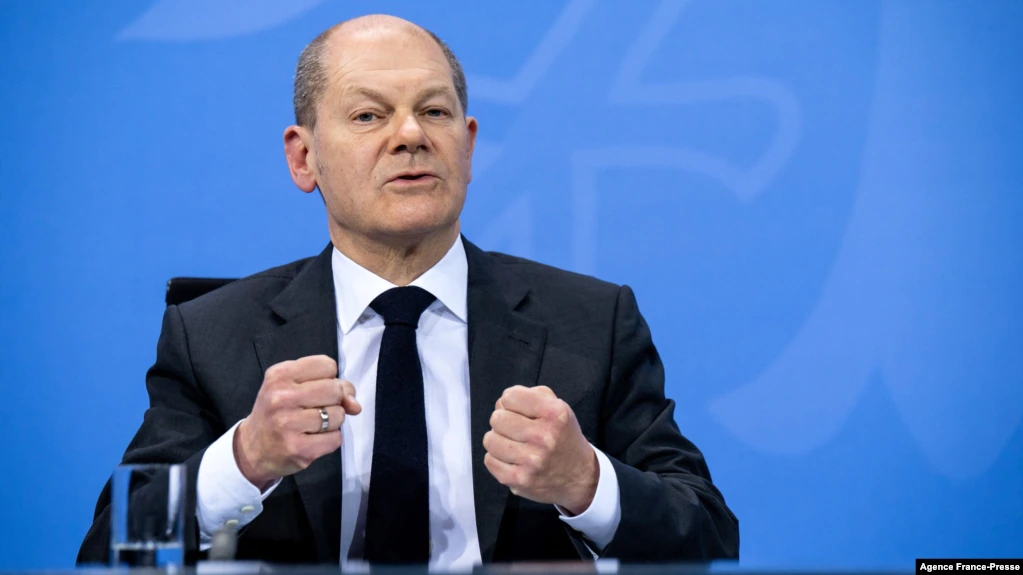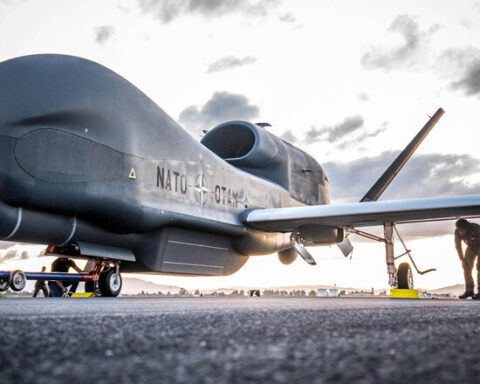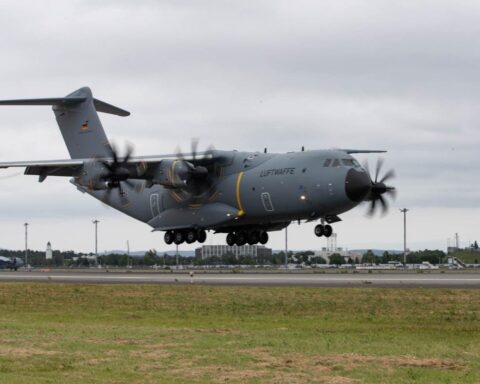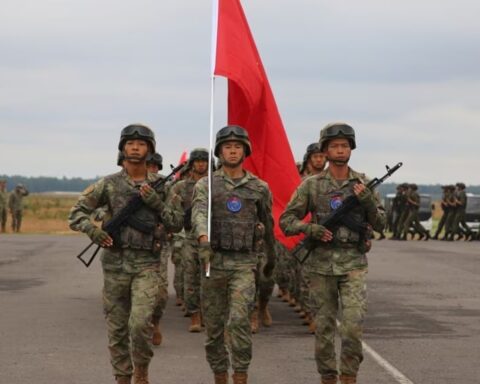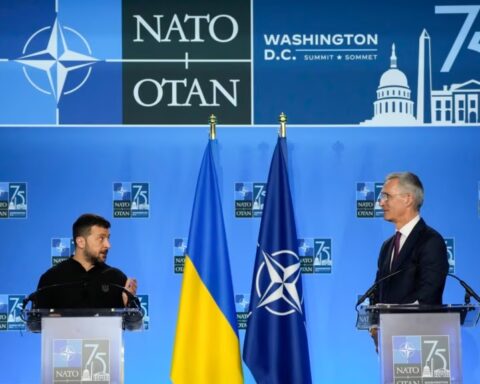German Chancellor Olaf Scholz wants to reset relations with Moscow and is planning a face-to-face meeting with Russian leader Vladimir Putin later this month.
Senior German officials were already scheduled to get together with Russian counterparts in January in a bid to ease geopolitical tensions amid rising alarm that the Kremlin is planning a further military incursion into Ukraine.
According to a report Monday by Germany’s Bild newspaper, foreign policy adviser Jens Plotner has been discussing with the Kremlin a meeting between the German leader and Putin for more than two weeks. The paper, which has a reputation of breaking domestic German political stories well ahead of media rivals, reported that Scholz is seeking “a new start” in relations with Moscow and wants to focus on energy politics and Ukraine.
US-Russia talks
Senior U.S. and Russian officials are to meet in Geneva for talks set for January 9 and 10 to discuss Russia’s military build-up on its border with Ukraine, where it has deployed around 100,000 troops, according to Western and Ukrainian intelligence officials.
Western leaders and officials have already rejected as nonstarters Russian demands, including a halt to further NATO enlargement and a rollback of any alliance military presence in the former Soviet satellite states of Central Europe.
The Geneva talks, which are to be led on the American side by senior State Department officials, are slated to be followed by Russia-NATO council talks and a meeting of the Organization for Security and Co-operation in Europe.
Western leaders have warned of severe consequences if the Kremlin decides to mount another attack on Ukraine in a repeat of 2014, when Russia annexed the Crimean Peninsula and used armed proxies to seize a large part of the Donbas region in eastern Ukraine, bordering Russia.
U.S. President Joe Biden told reporters Friday that he advised Putin when they spoke by phone a day earlier that the upcoming talks could only work if the Russian leader “de-escalated, not escalated, the situation” going forward. Biden said he also sought to make plain to Russia’s leader in his second conversation in a month with Putin that U.S. and European allies are ready to punish Russia with tough economic sanctions.
“I made it clear to President Putin that if he makes any more moves into Ukraine, we will have severe sanctions,” Biden said. “We will increase our presence in Europe with NATO allies.”
Kremlin officials, though, have doubled down on warnings to the West about making a “colossal mistake” that could have enormous ramifications for an already fraught U.S.-Russian relationship.
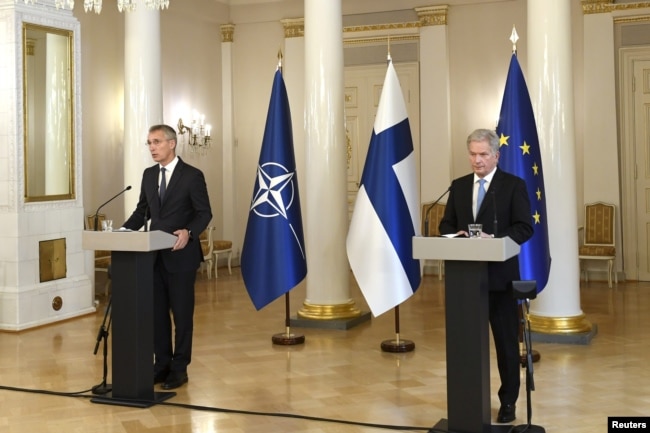
Unease among some European nations
But despite the tough talk from Washington, there is unease among smaller European nations who fear bigger Western powers may try to cut a deal with Moscow without their buy-in.
Finnish President Sauli Niinistö is demanding that all European nations, formal Western alliance members or not, be included in the security negotiations between Russia, the United States and NATO.
Niinistö has reiterated his country’s right to join NATO if it wants, a flat rejection of the Russian demand that NATO admits no new members.
“Finland’s room to maneuver and freedom of choice also include the possibility of military alignment and of applying for NATO membership, should we ourselves so decide,” Niinistö said in a strong New Year’s address.
He said Russia’s ultimatums “are in conflict with the European security order,” and he wants a significant role for the European Union in any negotiations to help express the security needs and views of smaller nations.
“In this situation, Europe cannot just listen in,” Niinistö said. “The sovereignty of several member states, also Sweden and Finland, has been challenged from outside the union. This makes the EU an involved party. The EU must not settle merely with the role of a technical coordinator of sanctions.”
Germany’s concerns
Scholz’s New Year’s address to Germans was milder, and while warning of a punishing Western response to any further Russian aggression toward Ukraine, he emphasized the importance of “constructive dialogue” with Russia.
The German chancellor has come under pressure from allies and members of his coalition government, including Foreign Minister Annalena Baerbock, leader of the country’s Green Party, to withhold any formal approval for Russian natural gas to be transported through the just-completed Nord Stream 2, an undersea pipeline linking Russia and Germany.
Central and eastern European countries criticized former Chancellor Angela Merkel for her support of the Nord Stream 2 project. They say the pipeline risks deepening European dependence on Russian gas. Last month, Poland’s prime minister publicly called on Scholz to oppose the startup of Nord Stream 2, warning that the pipeline could be used as a coercive economic weapon by Russia.
Aside from what tactics to employ, splits persist also among Western powers over assessments of Putin’s intentions. Italian Prime Minister Mario Draghi has downplayed the risk of Russian military action, saying the Kremlin wants to explore diplomacy and is not preparing “for action.”
Some Italian officials say they fear talk of impending war could take on a life of its own, impacting and shaping the behavior of Russia and the United States. They also point to the draft security treaties Russia presented to the U.S. last week as indicating a willingness for further talks.
U.S. officials have been seeking to reassure Central European governments that their views will be fully taken into account. U.S. Secretary of State Antony Blinken spoke Monday with the Bucharest Nine group of eastern flank NATO allies, according to Ned Price, State Department spokesperson.
Price said in a statement: “The Secretary and Foreign Ministers discussed Russia’s destabilizing military buildup along Ukraine’s border; the need for a united, ready, and resolute NATO stance for the collective defense of Allies; and transatlantic cooperation on issues of shared concern. The Secretary stressed the U.S. commitment to continued close consultation and coordination with all of our Transatlantic Allies and partners as we work toward de-escalation through deterrence, defense, and dialogue.”
The call participants included the foreign ministers of Poland, Bulgaria and Hungary.
On Monday, former NATO secretary general Anders Fogh Rasmussen called on Western powers to reject Russian security demands, saying the proposals from Putin aren’t serious.
Rasmussen, who served as secretary general from 2009 to 2014 and is a former Danish prime minister, said the Russian president had openly told him that he wanted to dismantle the Western security alliance. Writing for the Politico.eu news site, he said agreeing to “negotiate down the barrel of a gun” would only help Putin.
“When I met Russian President Vladimir Putin for the first time as NATO secretary general, he opened our meeting by telling me he wanted to disband NATO. If NATO allies engage with Russia’s most recent proposals … they will be directly helping him move a step closer to achieving his goal,” he added.
Putin and Kremlin officials say they have no plan to invade Ukraine, but they have also warned they will take retaliatory steps, if their conditions aren’t met.

